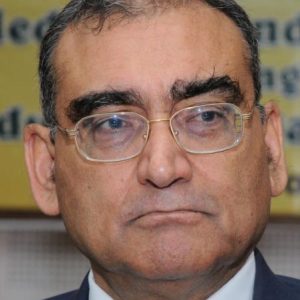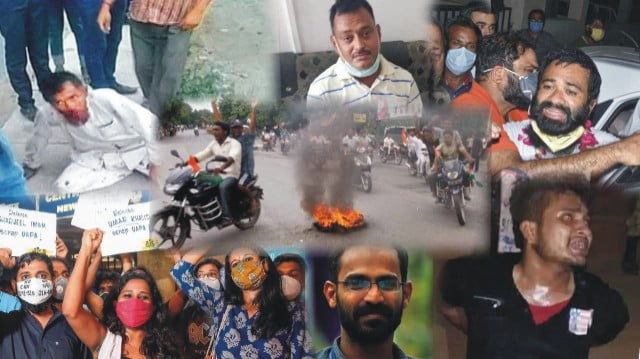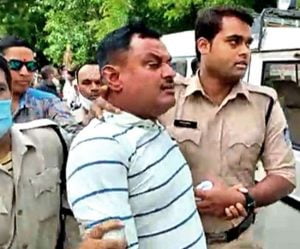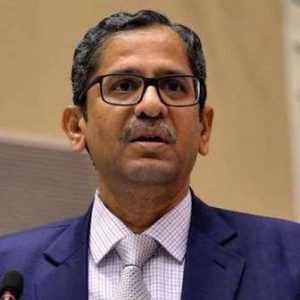

One of the most important functions of the state is to maintain law and order, and uphold the rule of law.

However, what is being witnessed in India is lawlessness, and violation of the rule of law, not so much by ordinary people but by the state authorities, or state backed and inspired vigilante groups.
This is reminiscent of what happened in much of Europe during Nazi rule, when there was no rule of law but arbitrary rule of the Gestapo.
In my article ‘Matsya Nyaya is coming in India‘ I have explained the concept of Matsya Nyaya (literally law of the fishes) or the law of the jungle, developed by our ancient thinkers, who were of the view that it is the worst state of affairs possible in society.
Consider the following :
1. The Indian Constitution declared India to be a democracy. In a democracy people have a right to criticise the government or laws which they feel are unjust.

But in India criticism of the government or the laws often results in being arrested on charges of sedition or the Unlawful Activities Prevention Act and being kept in jail for long periods.
For instance, Dr Kafeel Khan, Safoora Zargar, etc were arrested and kept in jail for a long period only for criticising the Citizenship Amendment Act.
Recently, in Manipur the journalist Kishorechand Wangkhem and an activist were arrested for saying that cow dung and cow urine do not cure corona.
Many more such examples can be given.
2. Fake police ‘encounters’ are a total violation of the rule of law, for what happens in them is that the police arrests someone and just bumps him off by a bullet.
The law requires that before punishing an alleged criminal a trial must be held, giving the accused an opportunity of hearing according to the Criminal Procedure Code.
Also, the punishment must be awarded only by the court, not by the police or any executive authority.

All these legal requirements are simply brushed aside in a fake encounter, and such ‘encounters’ often happen nowadays, e.g. in the state of UP where they appear to have become state policy (as they were in Punjab in the 1980s).
An example of this is the bumping off of Vikas Dubey
3. Atrocities on minorities are of common occurrence, though India professes to be a secular state. Lynching of Muslims are frequent, e.g. of Ikhlaque, Tabrez Ansari, Pehlu Khan, etc

4. The handling of the case of the alleged rape of a Dalit girl by several upper caste youth in Hathras by the state authorities shows the extent of the deep rot which has set in, and total collapse of the rule of law, in India’s largest state, Uttar Pradesh. Even the body of the victim was not handed over to her relatives, but was allegedly cremated by the police.
5. Poor people like the adivasis (tribals) in Chattisgarh who raise their voice against oppression and exploitation are often branded as ‘maoists’ and arrested for sedition and other crimes.

In these dark times, therefore, it was heartening to hear the speech of the present Chief Justice of India, N.V. Ramanna, in his recent Justice P. D. Desai Memorial lecture, in which he emphasised on the rule of law, and added that the polls are no guarantee against the tyranny of the elected.
But these were only words. What matters are deeds. Will the Indian judiciary rise to the occasion and order release of the large number of people who have been wrongly arrested and jailed ?
Will it check the executive which of late have been behaving like autocrats? Will it enforce the fundamental rights of the people in our Constitution, particularly the right to life and liberty in Article 21, the most precious of all rights? Only time will tell. ![]()
Also Read:
You are too powerful, Judge Sahib
‘Why I am a vaccine skeptic’ – Prashant Bhushan
___________________________________
Watch video:

Disclaimer : PunjabTodayTV.com and other platforms of the Punjab Today group strive to include views and opinions from across the entire spectrum, but by no means do we agree with everything we publish. Our efforts and editorial choices consistently underscore our authors’ right to the freedom of speech. However, it should be clear to all readers that individual authors are responsible for the information, ideas or opinions in their articles, and very often, these do not reflect the views of PunjabTodayTV.com or other platforms of the group. Punjab Today does not assume any responsibility or liability for the views of authors whose work appears here.
Punjab Today believes in serious, engaging, narrative journalism at a time when mainstream media houses seem to have given up on long-form writing and news television has blurred or altogether erased the lines between news and slapstick entertainment. We at Punjab Today believe that readers such as yourself appreciate cerebral journalism, and would like you to hold us against the best international industry standards. Brickbats are welcome even more than bouquets, though an occasional pat on the back is always encouraging. Good journalism can be a lifeline in these uncertain times worldwide. You can support us in myriad ways. To begin with, by spreading word about us and forwarding this reportage. Stay engaged.
— Team PT


Copyright © Punjab Today TV : All right Reserve 2016 - 2024 |